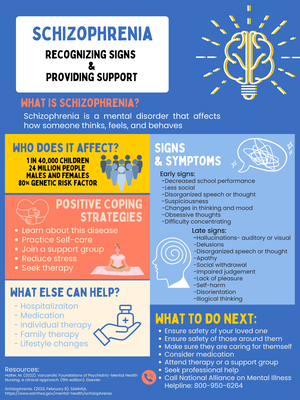- Information
- AI Chat
Was this document helpful?
NSG 322 Week 8 Socrative Answer Key
Course: Behavioral Health Nursing (NSG-322)
77 Documents
Students shared 77 documents in this course
University: Grand Canyon University
Was this document helpful?

NSG 322 Week 8 Socrative Answer Key – Schizophrenia Spectrum DO – Part 2
1.
A patient smiles broadly at the nurse and says, "Look at my clean teeth. I brushed them
with scouring powder because the label said, "it brightens and whitens everything."
Which term should the nurse include when documenting this encounter?
a. Circumstantiality
b. Concrete thinking
c. Poverty of speech
d. Associative looseness
i
b. Concrete thinking refers to literal interpretations, with an inability to comprehend
abstract concepts.
2.
A patient diagnosed with schizophrenia says, "I hear the voices every day. They always
say bad things about me." Which action by the nurse has the highest priority?
a. Assess the patient for suicidal thinking and plans.
b. Review the patient's medication regimen and adherence.
c. Educate the patient about symptoms associated with schizophrenia.
d. Suggest distracters for the patient to use when auditory hallucinations occur.
i
a. The daily experience of negativity creates a scenario in which the risk for suicide is
high. Depressive symptoms occur frequently in schizophrenia. Suicide is the leading
cause of premature death in this population.
3.
Three days after beginning a new regime of haloperidol (Haldol), the nurse observes
that a hospitalized patient is drooling, has stiff and extended extremities, and skin that
is damp and hot to the touch. The patient has difficulty responding verbally to the
nurse. What is the nurse's correct analysis and action in this situation?
a. A seizure is occurring; place the patient in a lateral recumbent position and monitor.
b. Serotonin syndrome has developed; place an intravenous line and rapidly infuse D5
1/2 normal saline (NS).
c. Neuroleptic malignant syndrome (NMS) has developed; prepare the patient for
immediate transfer to a medical unit.
d. An acute dystonic reaction is occurring; promptly administer an intramuscular
injection of diphenhydramine (Benadryl).
i
c. Neuroleptic malignant syndrome (NMS) occurs in persons who have taken
antipsychotic agents and usually begins early in the course of therapy. It is
characterized by a decreased level of consciousness, greatly increased muscle tone,
and autonomic dysfunction, including hyperpyrexia, labile hypertension, tachycardia,
tachypnea, diaphoresis, and drooling. Treatment consists of early detection,
discontinuation of the antipsychotic agent, management of fluid balance, reduction of
temperature, and monitoring for complications. Treatment of this problem should occur
in a medical unit. THIS IS CONSIDERED A MEDICAL EMERGENCY.
4.
A nurse begins a therapeutic relationship with a patient diagnosed with schizophrenia.
The patient has severe paranoia. Which comment by the nurse is most appropriate?
a. "Let's begin by talking about the goals you have for yourself."
b. "I understand that you have problems with fear and suspiciousness of others."









